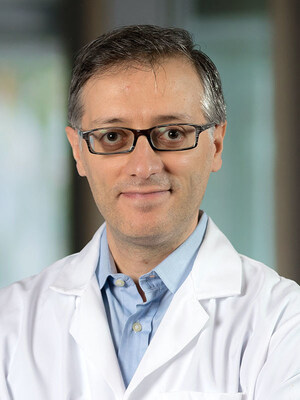BRONX, N.Y., July 10, 2019 /PRNewswire/ -- A drug belonging to a new generation of acute migraine headache treatments was found to eliminate pain and reduce bothersome symptoms for people with migraine in a large-scale trial reported in the July 11 issue of The New England Journal of Medicine. The drug, rimegepant, is awaiting U.S. Food and Drug Administration approval and may offer advantages over currently available migraine medications. The study was led by researchers at Albert Einstein College of Medicine and Montefiore Health System.
"For the first time in nearly three decades, people with migraine not helped by existing medications may have a new option to find relief during attacks," said Richard B. Lipton, M.D., the study's first author and Edwin S. Lowe Professor and vice chair of the Saul R. Korey Department of Neurology at Einstein and director of the Montefiore Headache Center.
Debilitating Disorder
Migraine headache affects about 12 to 14% of people, or more than a billion individuals worldwide. This chronic neurologic disorder involves periodic attacks of head pain along with symptoms that may include nausea as well as sensitivity to light and sound. More than three-quarters of migraine sufferers experience at least one migraine attack per month, and more than half are severely impaired during their attacks.
Currently, many people with migraine take triptan drugs (examples include sumitriptan, eletriptan, and rizatriptan), which were introduced in the 1990s. Triptans halt acute migraines by stimulating serotonin receptors, which in turn reduces inflammation and constricts blood vessels. But triptans don't help everyone, they can produce intolerable side effects, and—since they constrict vessels—shouldn't be taken by people with cardiovascular disease (CVD) or major CVD risk factors.
New Mechanism for Relief
People not helped by triptans, or those who can't take them, may benefit from the new class of drugs called, gepants, which includes rimegepant. Gepants work by targeting the receptors for a small protein, called CGRP, long implicated in migraine. During migraine attacks, CGRP is released resulting in pain. Gepants relieve the pain and other symptoms of migraine by blocking the CGRP pathway.
The New England Journal of Medicine trial assessed rimegepant, in a randomized double-blind trial involving more than 1,000 men and women with migraine at 49 centers in the U.S. The participants were instructed to take a tablet of rimegepant, or a matching placebo tablet, during a migraine attack, once moderate or severe pain developed. Before taking the tablet and for 48 hours afterwards, patients answered questions in an electronic diary concerning their pain and their most bothersome symptoms. Participants chose their most bothersome symptom from a list, including intolerance to light, intolerance to loud sounds, or nausea.
Two hours after taking their tablets, 19.6% of patients in the rimegepant group were free from pain compared with 12.0% in the placebo group—a statistically significant difference. Freedom from their most bothersome symptoms occurred in 37.6% of patients in the rimegepant group and 25.2% in the placebo group. Side effects were minimal, with nausea and urinary tract infections the only adverse effects reported in more than 1% of patients in each group and no adverse CVD effects observed.
"These results confirm that rimegepant's mechanism of action—blocking the CGRP pathway—effectively relieves pain and associated symptoms that occur during acute migraine attacks," said Dr. Lipton. "As someone who has studied CGRP blockers for more than a decade, I'm gratified to see their benefits confirmed in a large-scale clinical trial."
Other authors of the study are Robert Croop, M.D., Elyse G. Stock. M.D., David A. Stock, Ph.D., Beth A. Morris, B.A., Marianne Frost, M.A., Gene M. Dubowchik, Ph.D., Charles M. Conway, Ph.D., Vladimir Coric, M.D., and Peter J. Goadsby, M.D., Ph.D.
The clinical trial, led by Dr. Lipton, was sponsored by Biohaven, which makes rimegepant and may benefit financially from the results. Dr. Lipton is a paid consultant and a stockholder of Biohaven.
About Albert Einstein College of Medicine
Albert Einstein College of Medicine is one of the nation's premier centers for research, medical education and clinical investigation. During the 2018-2019 academic year, Einstein is home to 711 M.D. students, 160 Ph.D. students, 107 students in the combined M.D./Ph.D. program, and 265 postdoctoral research fellows. The College of Medicine has more than 1,800 full-time faculty members located on the main campus and at its clinical affiliates. In 2018, Einstein received more than $172 million in awards from the National Institutes of Health (NIH). This includes the funding of major research centers at Einstein in aging, intellectual development disorders, diabetes, cancer, clinical and translational research, liver disease, and AIDS. Other areas where the College of Medicine is concentrating its efforts include developmental brain research, neuroscience, cardiac disease, and initiatives to reduce and eliminate ethnic and racial health disparities. Its partnership with Montefiore, the University Hospital and academic medical center for Einstein, advances clinical and translational research to accelerate the pace at which new discoveries become the treatments and therapies that benefit patients. Einstein runs one of the largest residency and fellowship training programs in the medical and dental professions in the United States through Montefiore and an affiliation network involving hospitals and medical centers in the Bronx, Brooklyn and on Long Island. For more information, please visit www.einstein.yu.edu, read our blog, follow us on Twitter, like us on Facebook, and view us on YouTube.
About Montefiore Health System
Montefiore Health System is one of New York's premier academic health systems and is a recognized leader in providing exceptional quality and personalized, accountable care to approximately three million people in communities across the Bronx, Westchester and the Hudson Valley. It is comprised of 11 hospitals, including the Children's Hospital at Montefiore, Burke Rehabilitation Hospital and close to 200 outpatient care sites. The advanced clinical and translational research at its medical school, Albert Einstein College of Medicine, directly informs patient care and improves outcomes. From the Montefiore-Einstein Centers of Excellence in cancer, cardiology and vascular care, pediatrics, and transplantation, to its preeminent school-based health program, Montefiore is a fully integrated healthcare delivery system providing coordinated, comprehensive care to patients and their families. For more information please visit www.montefiore.org. Follow us on Twitter and view us on Facebook and YouTube.
SOURCE Albert Einstein College of Medicine

Related Links
WANT YOUR COMPANY'S NEWS FEATURED ON PRNEWSWIRE.COM?
Newsrooms &
Influencers
Digital Media
Outlets
Journalists
Opted In






Share this article